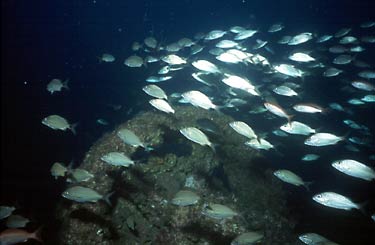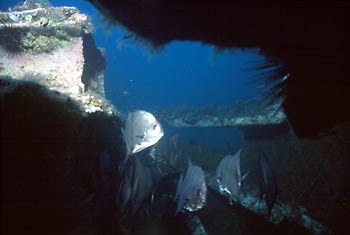The True Value of Water
The True Value of WaterBY DAVID E.W. FENNER
There is a debate in academic circles - those where ethics are discussed - about whether college courses in ethics make students morally better or not. I argue that they do not. I think such courses make students brighter and more critical about their own ethics. I think such courses encourage students to become generally more coherent in their overall ethical outlooks. But I do not think they make students morally better. I put the credit (or blame) for my students' morality at the doorsteps of their parents, their primary school teachers, their Sunday School teachers, and their neighborhoods (perhaps even their genetic make-ups). This is because I believe my students received their senses of morality at an early age, probably even before they left elementary school. I do not go so far as to say that the moral outlooks of students in college cannot be modified; indeed, I think they can be, but only through an internal shift in consciousness brought about through internal motivation. Generally I think, however, that by the time students reach college, their morals have pretty much gelled. This makes the teaching of ethics, for me, a matter of helping students understand what ethics and morals they bring to the class. One way I do this is to introduce the notion of a value chain. I do not take credit for this; it is a modification of something Aristotle talked about. But it is a straightforward way to understand one's own values. If a person who holds a particular value is motivated to action, is motivated to pursue the object of that value, then understanding one'svalues goes a long way to understanding how that person approaches ethical choices and dilemmas. All of this means that if a person is trying to understand the true value of a thing, then that individual needs to determine the true value of that thing for him- or herself. It does not make sense to me to try to convince someone that something is truly valuable if that individual simply does not hold that value in the first place. Lecturing a person about the value of a thing does not go very far. Anyone reading this essay that has kids, perhaps especially teenagers, will understand what I'm talking about. For instance, not every college student holds that education is valuable, and it is a piece of cake to determine which ones do and which ones do not. If my task in this article is to articulate the true value of water- as a resource for drinking, for bathing, for gardening, for recreation, for scuba-diving - then my true task is to get you to see how water fits into your values. This is where value chains come in. A value chain is a device for determining a person's true values. Many people may have a very clear vision of their values, and that's great; but many people may not, and this is where value chains can be helpful. Before showing you how they work, I first need to introduce two philosophical terms that have to do with values. Philosophers have lots of words to differentiate one sort of value from another (e.g., intrinsic, extrinsic, inherent, instrumental), but we need to focus only on two: "intrinsic-- and-- instrumental." Something that is intrinsically valuable, or is an intrinsic good, is good on its own, good for its own sake, good without reference to anything else. Something that is instrumentally valuable, or is an instrumental good, is good for what it can accomplish, what it can bring about. An instrumental good is not necessarily good on its own, but good because of what it leads to. Value chains are made up of noting lots of instrumental goods and (a few) intrinsic ones. Here's how value chains work. First, think of some routine, mundane, trivial activity that you perform. Second, ask yourself, "Why do I do that?" Third, ask yourself about the answer you just gave, "Why do I do THAT?"Here's an example: About every other day I meet a class of students in a course entitled "Introduction to Philosophy."
What we are doing is building a chain. Each link in that chain is a value link, a goal or value that one holds that motivates that person to do some activity - activities even down to the apparently routine, mundane, trivial activities that occupy so much of our time. These links are all instrumental values: things we do or pursue because of what they lead to. The final link, or final links, in our value chains represent those things we hold intrinsically valuable, valuable for their own sakes. In the case above, "happiness" is the final link. It is the final link because it does not make sense to ask why happiness is valuable; we just find happiness to be valuable (full stop).
Those value links that we find higher along in our chains represent values that we hold dearer than those values represented by links down toward the bottom, or the beginnings, of our chains. This is important because it allows us to chart our values, separating what we might call our "peripheral" values from our more important, core values. Core values are values by which we live our lives. For some people, core values are values for which they would be willing to die. One never gives up his/her core values. If that ever happens, then that person has given up everything. But peripheral values are ones that we would be willing to give up in those situations where doing so supports our core values. Peripheral values can be "negotiated" or "compromised" if doing so leads us closer to our core values. For instance, if you have to catch the bus in the morning, and you are running late, then while you might value taking the time to have breakfast and read the newspaper, you might give those things up in order to catch that bus. Catching the bus is necessary for you to get to work on time, and getting to work on time is higher on your priority list than having breakfast and reading the paper. "Higher on your priority list" translates into being a higher link on a value chain that includes, in this case, both having breakfast and getting to work on time. Value links that are very high up in our chains tend to represent our core values, or at least values that are closer to being core values than those links lower in our chains. So what does this have to do with finding the true value of water? At this point, it is fairly simple. If you are trying to determine how much you value water, then simply run a few value chains - create a few value chains - which involve water. The chances are quite high that time after time you will find that water, as something you value instrumentally, is very high in your chains. In fact, for a few individuals, it may be so high as to constitute a core value; for some, it might even be intrinsically valuable. The true value of water has to do with how you, as a valuer of water, value it. Do you value it? The chances, as I said above, are excellent that you do, and that you hold it in great esteem as demonstrated by the position it occupies in your value chains, in the way you see the value of things in the world. Since our actions flow from our values, it follows that once you have seen how valuable water is - and not in some academic sense or because someone else thinks it's valuable - your actions, in terms of how you treat water, cannot fail to be ethical. The key is simply realizing how valuable water is to you. Copyright ©2004 Global
Underwater Explorers.
All rights reserved. |



